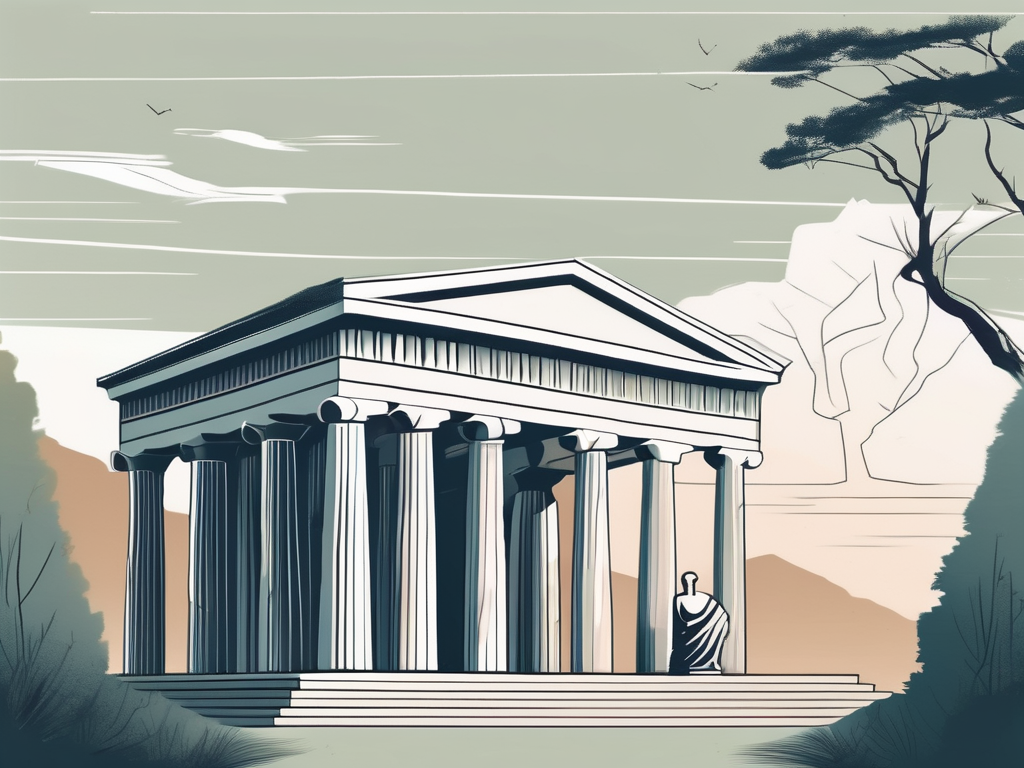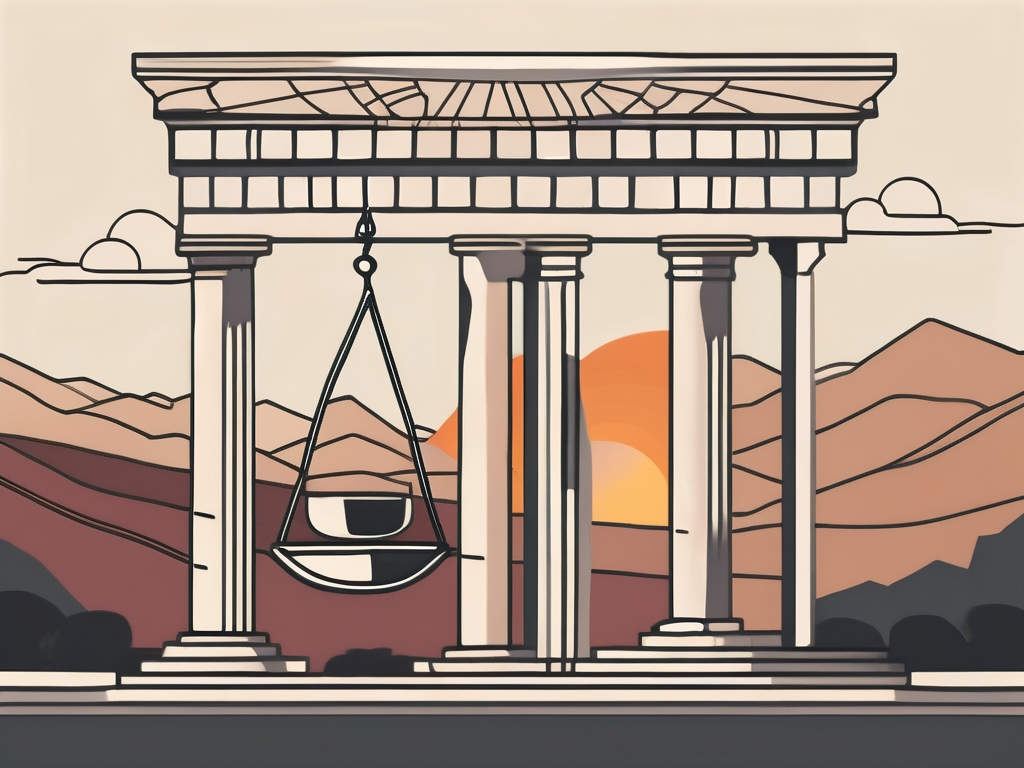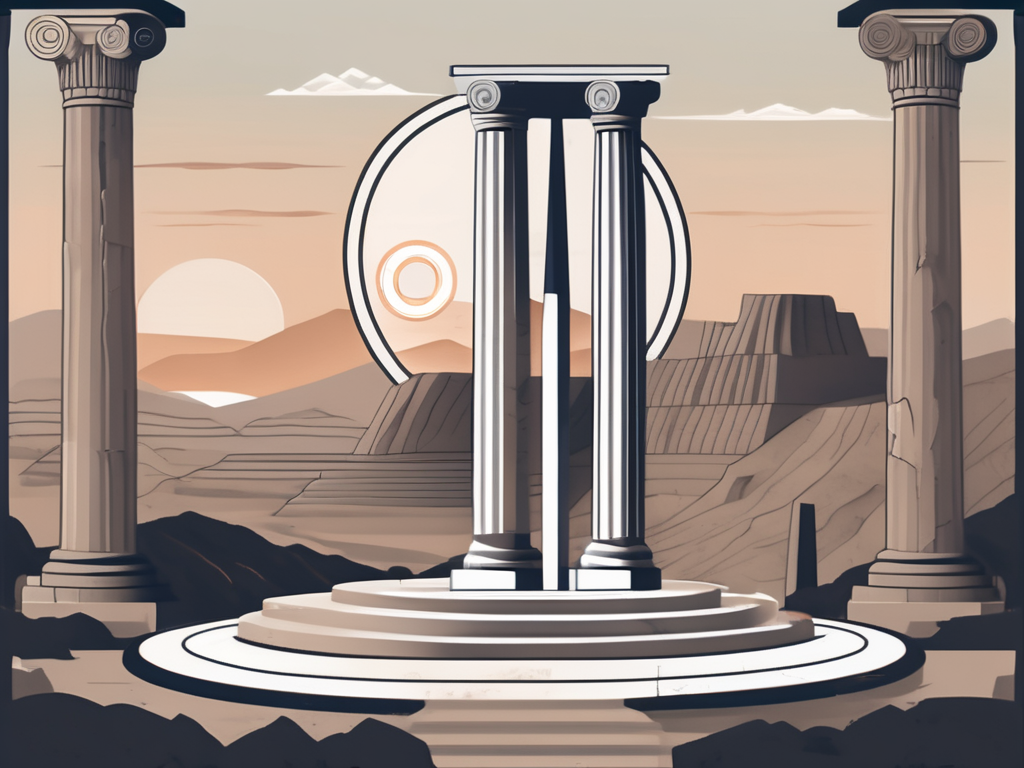Stoicism is a fascinating concept that has sparked numerous debates and discussions among philosophers, theologians, and enthusiasts. One question that often arises is whether Stoicism should be considered a religion or not. In order to fully understand this topic, it is essential to delve into the origins, principles, and distinctive features of Stoicism, as well as compare it to traditional religions and philosophies. Let’s explore these aspects and see if we can shed some light on this intriguing question.
Understanding the Concept of Stoicism
Before delving into the debate of whether Stoicism is a religion or not, it is crucial to grasp the essence of this philosophy. Stoicism originated in ancient Greece around the 3rd century BC and was further developed in Rome. It was founded by a Greek philosopher named Zeno of Citium and gained popularity through the teachings of notable figures such as Seneca, Epictetus, and Marcus Aurelius.
Origins and History of Stoicism
Stoicism stemmed from the Greek word “stoa,” meaning porch or portico, as it was often taught in public places. The philosophy emphasized the importance of virtue, self-control, and acceptance of fate. Stoics believed that one’s emotions should be governed by reason and that external circumstances should not dictate one’s inner peace and well-being.
The origins of Stoicism can be traced back to Zeno of Citium, who was inspired by the teachings of Socrates and the Cynics. Zeno established his school of philosophy in Athens, where he would gather his students and engage in discussions about the nature of reality, ethics, and the pursuit of happiness. These discussions took place in the Stoa Poikile, a public portico that gave the philosophy its name.
Over time, Stoicism spread throughout the Roman Empire, attracting followers from all walks of life. It resonated with people seeking guidance on how to navigate the challenges of daily life and find inner tranquility. The Stoic teachings were particularly appealing to the Roman elite, including statesmen, soldiers, and emperors, who sought to cultivate virtues and lead a virtuous life.
Key Principles of Stoicism
At its core, Stoicism centers around a few key principles. Firstly, it emphasizes the distinction between what is within our control, namely our thoughts, actions, and attitudes, and what lies beyond our control, such as external events and other people’s opinions. This distinction allows Stoics to focus their energy on what they can change and accept what they cannot.
The Stoics believed that by focusing on what is within our control, we can cultivate a sense of inner peace and resilience. They recognized that external circumstances are often beyond our control, and instead of being consumed by them, they encouraged individuals to direct their attention inward and work on developing their character and virtues.
In addition to the distinction between what is within and beyond our control, Stoicism encourages individuals to cultivate virtues such as wisdom, courage, justice, and temperance, which are seen as the foundation for a good and fulfilling life. These virtues are not seen as abstract concepts but rather as practical guidelines for ethical living.
Stoics also advocate for living in harmony with nature and accepting the impermanence of everything around us. By embracing the transitory nature of existence, Stoics believe that one can attain tranquility and inner peace. They encourage individuals to detach themselves from material possessions and external circumstances, finding contentment within themselves.
Furthermore, Stoicism emphasizes the importance of self-reflection and the practice of mindfulness. Stoics believed in regularly examining one’s thoughts, actions, and beliefs to ensure they align with virtue and reason. This self-examination allows individuals to identify and correct any flaws in their character, leading to personal growth and a deeper understanding of oneself.
Overall, Stoicism offers a comprehensive philosophy of life that provides guidance on how to navigate the complexities of the world while maintaining inner tranquility and moral virtue. Its principles continue to resonate with individuals seeking wisdom and a path to a meaningful and fulfilling existence.
Comparing Stoicism and Religion
When examining the relationship between Stoicism and religion, it becomes evident that while they may share certain similarities, they also exhibit distinctive characteristics that set them apart. By exploring both the common grounds and the distinctive features of Stoicism and religion, we can gain a deeper understanding of their respective philosophies.
Common Grounds Between Stoicism and Religion
Stoicism and religion do share some common elements, despite their differences. Both philosophies emphasize the importance of living a virtuous life and cultivating qualities such as compassion, kindness, and selflessness. They recognize the significance of moral values and ethics in guiding human behavior and promoting a harmonious society.
Furthermore, both Stoicism and religion address the existential questions that have puzzled humanity for centuries. They delve into the nature of human existence, the purpose of life, and the foundations of morality. By contemplating these profound inquiries, individuals can gain insight into their own lives and find meaning in the world around them.
Distinctive Features of Stoicism and Religion
While Stoicism and religion share common grounds, they also possess distinct differences that set them apart as separate philosophies.
Religions often involve a belief in higher powers, divine beings, and supernatural forces. They provide a framework for understanding the universe and human existence through the lens of faith. In contrast, Stoicism is primarily concerned with the human experience and the development of one’s character. It places a strong emphasis on reason and personal responsibility, encouraging individuals to take control of their own lives and strive for moral excellence.
Additionally, religions often have specific rituals, scriptures, and communal practices that shape their followers’ lives. These practices serve as a means of connecting with the divine and fostering a sense of community. In contrast, Stoicism is more individualistic, focusing on personal growth and self-improvement rather than the adherence to a specific set of religious practices or dogmas. Stoics believe that by cultivating their own virtues and living in accordance with reason, they can achieve tranquility and inner peace.
In conclusion, while Stoicism and religion may share certain similarities in their emphasis on virtue and the exploration of existential questions, they also possess distinctive features that differentiate them. Stoicism centers around personal responsibility and the development of one’s character, while religion often involves a belief in higher powers and specific rituals. By understanding these similarities and differences, individuals can gain a more comprehensive perspective on the complexities of human philosophy and spirituality.
Stoicism as a Philosophy of Life
Stoicism, in essence, can be seen as a comprehensive philosophy of life rather than a religion. Its teachings provide practical guidance on how to navigate the challenges of life and cultivate inner resilience. Let’s explore two significant aspects of Stoicism: its approach to life’s challenges and its influence on modern philosophy.
Stoicism’s Approach to Life’s Challenges
Stoicism teaches individuals to focus on what they can control rather than being consumed by anxieties and worries about external circumstances. It encourages a mindset of acceptance and adaptability in the face of adversity. By developing resilience and emotional self-mastery, Stoics believe that one can maintain inner tranquility even in the midst of life’s difficulties.
Furthermore, Stoicism emphasizes the importance of living in accordance with nature. According to Stoic philosophy, nature has its own order and rhythm, and it is our duty to align ourselves with it. By accepting the natural flow of events and recognizing that everything happens for a reason, Stoics find solace in the face of challenges. This perspective allows them to approach difficulties with a sense of calm and equanimity.
In addition to its philosophical principles, Stoicism also offers practical techniques to help individuals navigate life’s challenges. One such technique is negative visualization, which involves imagining the worst-case scenarios in order to appreciate the present moment and cultivate gratitude. By envisioning the loss of what we hold dear, Stoics believe that we can develop a deeper appreciation for what we currently have, leading to greater contentment and resilience.
Another powerful practice in Stoicism is the concept of memento mori, or remembering one’s mortality. By acknowledging the inevitability of death, Stoics are reminded of the fleeting nature of life and the importance of making the most of each moment. This practice instills a sense of urgency and encourages individuals to prioritize what truly matters, allowing them to face challenges with a renewed perspective and a greater sense of purpose.
Stoicism’s Influence on Modern Philosophy
Throughout history, Stoicism has had a profound influence on various fields, including ethics, psychology, and modern philosophy. Its teachings have inspired renowned philosophers such as Immanuel Kant and Friedrich Nietzsche, as well as psychologists like Albert Ellis and Viktor Frankl.
Stoic concepts, such as the dichotomy of control, the importance of virtue, and the power of reason, continue to resonate with many individuals seeking wisdom and guidance in their lives. The dichotomy of control, for example, teaches that we should focus our energy on what is within our control, such as our thoughts and actions, rather than wasting it on things beyond our control, such as external circumstances or the opinions of others. This principle empowers individuals to take responsibility for their own happiness and well-being, regardless of external factors.
Furthermore, Stoicism’s emphasis on virtue as the highest good has shaped ethical theories and discussions throughout history. Virtue, according to Stoicism, is not just about personal excellence but also about living in harmony with others and the natural world. This emphasis on moral character and integrity continues to be a central theme in modern ethical debates.
Stoicism’s practical approach to managing emotions and dealing with life’s uncertainties has made it particularly appealing in today’s fast-paced and unpredictable world. Its teachings provide individuals with a framework for finding inner peace and contentment amidst the chaos of modern life. By cultivating resilience, accepting the imperfections of the world, and focusing on what truly matters, Stoicism offers a path to living a meaningful and fulfilling life.
The Debate: Stoicism as a Religion
Despite Stoicism being predominantly viewed as a philosophy, there are arguments from both sides regarding whether it can be considered a religion. Let’s examine some of these arguments and counterarguments to gain a deeper understanding of the debate.
Arguments for Stoicism as a Religion
Proponents of considering Stoicism as a religion argue that it does possess certain religious elements. They contend that the emphasis on virtues, the search for meaning and purpose, and the focus on achieving inner peace can be interpreted as spiritual pursuits that are common in religious practices.
Moreover, Stoicism encourages individuals to develop a personal relationship with the universe and nature. This connection is often described as a form of reverence and awe, similar to religious experiences. The practice of contemplating life’s harmony and interconnectedness can be seen as a way to establish a spiritual connection with the world around us.
Furthermore, Stoicism provides a moral framework that guides individuals in their daily lives. The cultivation of virtues such as wisdom, courage, justice, and temperance can be seen as a form of religious devotion, as adherents strive to align their actions with these principles.
Counterarguments Against Stoicism as a Religion
On the other hand, skeptics argue that Stoicism lacks the essential elements that define a religion. It does not involve worship, rituals, or the belief in deities. Stoicism’s emphasis on reason, self-improvement, and personal responsibility align more with a philosophy of life rather than a religious system.
Additionally, Stoicism’s compatibility with various religious and philosophical frameworks suggests that it can coexist with different belief systems. This flexibility further supports the characterization of Stoicism as a philosophy rather than a religion.
Moreover, some critics argue that Stoicism’s focus on self-improvement and personal responsibility may be seen as individualistic, in contrast to the communal aspects often associated with religious practices. While religion often involves a sense of community and collective worship, Stoicism places a greater emphasis on individual growth and self-reflection.
Furthermore, the absence of a central authority or organized structure in Stoicism distinguishes it from traditional religious institutions. Religions typically have hierarchies, clergy, and established rituals, which are not present in Stoicism.
Despite these counterarguments, the debate regarding Stoicism’s classification as a religion or philosophy continues to be a topic of discussion among scholars and practitioners alike. The diverse perspectives on this matter contribute to a broader understanding of the complexities surrounding the nature of Stoicism.
Conclusion: Is Stoicism a Religion or a Philosophy?
After examining the origins, principles, and distinctive features of Stoicism, as well as comparing it to religion, it is evident that Stoicism is primarily a philosophy of life. While it shares some common grounds with religion, its emphasis on reason, personal responsibility, and self-improvement sets it apart from traditional religious practices.
Stoicism’s timeless teachings continue to provide valuable insights and guidance for those seeking to navigate the complexities of life. Whether one chooses to embrace it as a philosophy or incorporate it into their religious or spiritual beliefs, Stoicism offers practical tools for cultivating resilience, inner peace, and a life of virtue.
So, is Stoicism a religion? The answer appears to lie in the eyes of the beholder, as individuals interpret and relate to Stoicism based on their own beliefs, experiences, and perspectives. Ultimately, what truly matters is the wisdom and inspiration one can derive from this ancient philosophy in their quest for a meaningful and fulfilling life.












